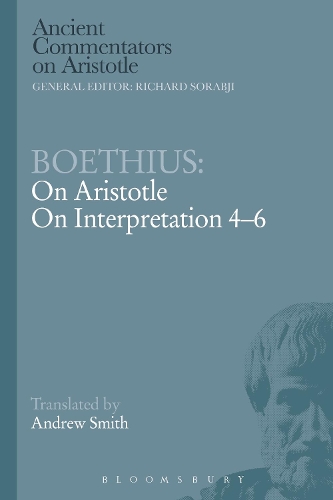
Boethius: On Aristotle on Interpretation 4-6
(Paperback)
Available Formats
Hardback
Published: 24th February 2011
Paperback
Published: 10th April 2014
Paperback
Published: 10th April 2014
Hardback
Published: 22nd July 2010
Publishing Details
Boethius: On Aristotle on Interpretation 4-6
By (Author) Boethius
Translated by Andrew Smith
Bloomsbury Publishing PLC
Bloomsbury Academic
10th April 2014
United Kingdom
Classifications
Tertiary Education
Non Fiction
Philosophy: epistemology and theory of knowledge
121.68
Physical Properties
Paperback
160
Width 156mm, Height 234mm
236g
Description
Boethius (c. 480-c. 525) was a Christian philosopher and author of many translations and works of philosophy, most famously the Consolations of Philosophy which were probably written when he was under house arrest, having been accused of treason by King Theoderic the Great. He was subsequently executed. On Interpretation is the second part of the Organon, as Aristotle's collected works on logic are known; it deals comprehensively and systematically with the relationship between logic and language. In his first six chapters, Aristotle defines name, verb, sentence, statement, affirmation and negation. Boethius preserves lost interpretations by two of the greatest earlier interpreters, Alexander and Porphyry, and the defence of the work's authenticity against criticism. He records the idea of Porphyry that Aristotelians believe in three types of name and verb, written, spoken and mental, in other words a language of the mind. Boethius' commentary formed part of his project to bring knowledge of Plato and Aristotle to the Latin-speaking world. It had great influence, remaining the standard introduction to On Interpretation throughout the Latin Middle Ages.
Author Bio
Andrew Smith is Professor of Classics, University College Dublin, Ireland.
